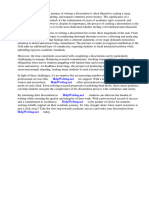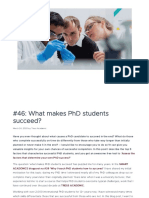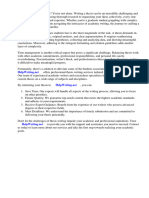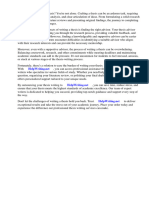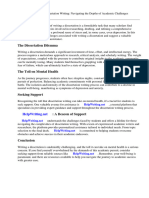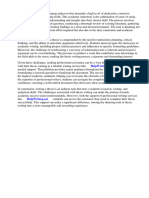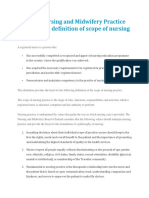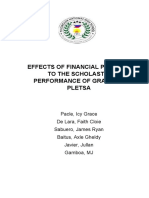Studying A PHD DNT Suffer in Silence
Studying A PHD DNT Suffer in Silence
Uploaded by
Amit AgrawalCopyright:
Available Formats
Studying A PHD DNT Suffer in Silence
Studying A PHD DNT Suffer in Silence
Uploaded by
Amit AgrawalOriginal Description:
Original Title
Copyright
Available Formats
Share this document
Did you find this document useful?
Is this content inappropriate?
Copyright:
Available Formats
Studying A PHD DNT Suffer in Silence
Studying A PHD DNT Suffer in Silence
Uploaded by
Amit AgrawalCopyright:
Available Formats
Studying a PhD: don't suffer in silence
Doing a PhD has always been seen as a long and lonely business since the early 19th century
when the idea of the postgraduate researchdoctorate was first formally recognised at
Humboldt University, Germany. It is probably the toughest test anyone can face in academic
life. In the past, there was a very low completion rate of PhDs throughout the world. This
meant a lot of wasted time, money, much personal heartache andpsychological distress.
Since 2000, particularly in the UK, USA and Australia, there has been anincrease in skills
training, support and stricter guidelines of good practice to support PhD students through
their research.
There are patterns, such as that science students mostly complete quicker and in higher
numbers than social science, arts and humanitiesresearch students. Factors helping to
contribute to this include less isolation, greater levels of team work (although that brings its
own problems), more involvement with supervisors and more of a regulated work ethos, with
a requirement to attend daily laboratory sessions.
Arts, social sciences and humanities students can have a more isolated and
less structured experience. This means they have to be far more self-regulated and motivated,
but also more resilient to the inevitable disappointments and confusion of exploring what can
feel like an overwhelming area of research.
Good supervisors can help advise their students but can't teach them like undergraduates. It is
odd that students are selected for PhDs usually on the basis that they are good at passing
exams, while doctoral research requires a completely different set of educational and
psychological skills. Many PhD students find this very difficult, as long periods of isolated
study (or paralysed procrastination) can induce obsessive rumination. It is inevitable that
some students will focus on all the negative aspects of their work and experience, which can
create the conditions for depressive and anxious symptoms.
The percentage of students accessing the counselling service at Oxford is approximately
7.5%. This is within the normal range of access at UK universities and by no means the
highest figure of students accessing counselling services.
What is different at Oxford (and other research-focused universities such as Cambridge,
Imperial and LSE) is that there is a much higher proportion of students doing doctoral
research compared with most universities. Out of the 22,000 students at Oxford,
approximately 42% are postgraduates, either doing taught masters or doctoral research. 42%
of all students accessing the counselling service are postgraduates, giving an exactly
proportionate representation.
Typical challenges PhD students face and how to cope with them
Perfectionism
Being a perfectionist is setting oneself an impossible standard to achieve. If you are always
trying to do an impossible task it can be demoralising, demotivating and ultimately could
cause depression. A PhD thesis is something realistic to achieve; it doesn't have to win the
Nobel Prize. It can be excellent but will never be perfect.
Perfectionism can feel like a friend who you think is encouraging you but is actually the
enemy within, the perfectionist bully inside your head, undermining all your achievements. If
you are an absolute perfectionist you will always feel disappointed in yourself, others and
your experience of life.
Procrastination
There are lots of traps that can catch you out and turn you from a normal functioning
procrastinator to being a paralysed one. Research studentsoften have the misguided idea that
they work best through motivation alone. This does not get you through the many years of
academic hard slog when the work is not going well. This is why it is important to have
work and life structure, treating your PhD like a job with set working hours and targets on a
short, medium and long term basis.
Having a good work and life structure can help alleviate the pervasive anxiety of an internal
nagging voice saying you should be working.Break down your work into manageable
tasks rather than constantly feeling overwhelmed by the enormousness of your
research. Make sure you have your priorities right. It is easy to become distracted by many
other things, not just Facebook but things that seem to be work such as being a departmental
student rep, teaching, helping with others' research and various welfare and peer support roles
to name but a few. All of these are important but not the main task for a doctoral researcher.
Isolation
Doing a PhD can put pressure on all our sensitive spots. For many people, there is a fear of
being a fraud, or in psychological speak the "imposter syndrome". This often stops PhD
students from being honest with themselves and others when they are finding their research a
struggle. It is important to have honest and supportive relationships with other
researchers to provide valuable encouragement and reality checking. Raise concerns and get
support from your supervisor, your department or support services rather than wait until
things get into a crisis. Inez von Weitershausen gave helpful advice in her blog, especially
about choosing what works best for each different PhD student.
You also need to actively engage in the support that is offered. There is much support for
PhD students, but it will not be able to take away all the fears, confusion, hard graft and
sometimes feelings of despair that virtually all PhD students go through from time to time.
Unfortunately this is one of the hidden and necessary parts of learning to become an
independent academic researcher. Building up the resilience and skills to cope with the
uncertainty of researching a new area of academic knowledge is a great strength for all
future academics, researchers and very useful for life in general.
It is important not to deny that there are many and varied difficulties and problems in doing a
PhD, however, the risk is to make over-simplified explanations or causes. This can lead to
a blame culture which in the end can be unhelpful and harmful to finding real support.
Alan Percy is head of counselling at the University of Oxford and spokesperson for BACP
UC (British Association of Counselling and Psychotherapy Universities and Colleges).
You might also like
- Test Bank For Marketing The Core 8th Edition Roger Kerin Steven HartleyDocument40 pagesTest Bank For Marketing The Core 8th Edition Roger Kerin Steven HartleyLance Strasser100% (42)
- SEO For DummiesDocument5 pagesSEO For DummiesBrad JNo ratings yet
- Sponge Iron PlantDocument11 pagesSponge Iron PlantLi GaryNo ratings yet
- University of Sydney Thesis SubmissionDocument8 pagesUniversity of Sydney Thesis Submissionsuzannehornbillings100% (2)
- Life and Research: A Survival Guide for Early-Career Biomedical ScientistsFrom EverandLife and Research: A Survival Guide for Early-Career Biomedical ScientistsNo ratings yet
- PHD Dissertation WritingDocument6 pagesPHD Dissertation WritingScientificPaperWritingServicesUK100% (1)
- A PHD State of Mind - Nature 2018Document1 pageA PHD State of Mind - Nature 2018Vedran GrmusaNo ratings yet
- SJFC DissertationDocument8 pagesSJFC DissertationPaperWritingCompanyBillings100% (1)
- Higher Education Thesis IdeasDocument6 pagesHigher Education Thesis Ideasmizhesternewark100% (1)
- Doctoral Dissertation ExamplesDocument5 pagesDoctoral Dissertation ExamplesBuyAPaperForCollegeUK100% (1)
- Significato Dissertation SubjectDocument7 pagesSignificato Dissertation SubjectBuyCheapPaperOnlineScottsdale100% (1)
- #46 - What Makes PHD Students Succeed - Tress AcademicDocument15 pages#46 - What Makes PHD Students Succeed - Tress AcademicSimon Emmanuel IkoojoNo ratings yet
- Thesis Problems and SolutionsDocument6 pagesThesis Problems and Solutionsdqaucoikd100% (1)
- Rate My ThesisDocument6 pagesRate My Thesisangelabaxtermanchester100% (2)
- Importance of Coursework in PHDDocument7 pagesImportance of Coursework in PHDf5dpebax100% (1)
- 10 Easy Ways To Fail A PHDDocument5 pages10 Easy Ways To Fail A PHDmexx4u2nvNo ratings yet
- How Long Does It Take To Complete A Doctoral DissertationDocument8 pagesHow Long Does It Take To Complete A Doctoral DissertationWriteMyPaperFastMurfreesboroNo ratings yet
- Ual Dissertation ExamplesDocument8 pagesUal Dissertation ExamplesCustomHandwritingPaperCanada100% (1)
- Charting A Course For A Successful Research CareerDocument123 pagesCharting A Course For A Successful Research CareerOmicsScienceNo ratings yet
- Thesis Defense AnxietyDocument5 pagesThesis Defense Anxietygbwygt8n100% (2)
- Master Your Thesis. Proven Strategies and Methods. It's Time To Get Your Life Back! by Caroline Dale 2022Document140 pagesMaster Your Thesis. Proven Strategies and Methods. It's Time To Get Your Life Back! by Caroline Dale 2022לירז גלNo ratings yet
- Thesis Title in Guidance and CounselingDocument6 pagesThesis Title in Guidance and Counselinglisakennedyfargo100% (2)
- Best Thesis Topics For PsychologyDocument4 pagesBest Thesis Topics For PsychologyDereck Downing100% (1)
- Utexas Dissertation GuidelinesDocument4 pagesUtexas Dissertation GuidelinesCustomPaperSeattle100% (1)
- Going For A PHD Joys and PitfallsDocument6 pagesGoing For A PHD Joys and PitfallsFabio FabioniNo ratings yet
- How To Get A Research Degree A Survival GuideDocument145 pagesHow To Get A Research Degree A Survival Guideryujin_33No ratings yet
- PHD Dissertation BoredomDocument6 pagesPHD Dissertation BoredomPayForAPaperUK100% (1)
- Dissertation Consultant JobsDocument8 pagesDissertation Consultant JobsBuyingCollegePapersOnlineCanada100% (1)
- PHD Thesis BurnoutDocument7 pagesPHD Thesis Burnoutrobinmoralestopeka100% (2)
- Dissertation Topics in PaediatricsDocument5 pagesDissertation Topics in PaediatricsCollegePaperWritingServiceReviewsSingapore100% (1)
- Oser Le Doctorat - enDocument28 pagesOser Le Doctorat - endaanaahishmaelsNo ratings yet
- Finish Your Dissertation, Darling!: Successful Strategies for Overcoming Procrastination, Isolation, Writing Blocks, Wish for Perfection, Unresponsive Professors, Troublesome Relatives & Research Gone AwryFrom EverandFinish Your Dissertation, Darling!: Successful Strategies for Overcoming Procrastination, Isolation, Writing Blocks, Wish for Perfection, Unresponsive Professors, Troublesome Relatives & Research Gone AwryRating: 4 out of 5 stars4/5 (1)
- Dissertation Scholarly Research Recipes For SuccessDocument6 pagesDissertation Scholarly Research Recipes For SuccessWriteMyPaperForMeIn3HoursCanadaNo ratings yet
- Thesis AdvisorDocument4 pagesThesis Advisoraflnwcaabxpscu100% (2)
- Getting A PHD Without CourseworkDocument6 pagesGetting A PHD Without Courseworkbd9gjpsn100% (2)
- Getting In: The Essential Guide to Finding a STEMM Undergrad Research ExperienceFrom EverandGetting In: The Essential Guide to Finding a STEMM Undergrad Research ExperienceNo ratings yet
- Is Doctoral Dissertation CapitalizedDocument8 pagesIs Doctoral Dissertation CapitalizedPaperWritingServiceCollegeCanada100% (1)
- Basic Research Strategies: A Guidebook for Stressed Thesis and Dissertation WritersFrom EverandBasic Research Strategies: A Guidebook for Stressed Thesis and Dissertation WritersRating: 4.5 out of 5 stars4.5/5 (2)
- Can A Dissertation Be Done in A WeekDocument8 pagesCan A Dissertation Be Done in A WeekWriteMyPaperCheapUK100% (1)
- Peer Pressure Thesis PDFDocument8 pagesPeer Pressure Thesis PDFjackiehintonwashington100% (2)
- The Part-Time Researcher: Tristram Hooley Senior Programme Manager VitaeDocument55 pagesThe Part-Time Researcher: Tristram Hooley Senior Programme Manager Vitaeapi-25889220No ratings yet
- Ocd Thesis QuestionDocument8 pagesOcd Thesis QuestionBuyEssaysOnlineForCollegeSiouxFalls100% (1)
- Masters Degree Without ThesisDocument7 pagesMasters Degree Without ThesisLuz Martinez100% (2)
- PHD by Coursework and DissertationDocument4 pagesPHD by Coursework and Dissertationrqaeibifg100% (2)
- What Are Some Characteristics of A Weak Thesis StatementDocument8 pagesWhat Are Some Characteristics of A Weak Thesis StatementBuyCustomPaperSingapore100% (1)
- Making The Right Moves: A Practical Guide To Scientifıc Management For Postdocs and New FacultyDocument18 pagesMaking The Right Moves: A Practical Guide To Scientifıc Management For Postdocs and New Facultymarcio-motoNo ratings yet
- Doctoral Thesis in Clinical PsychologyDocument4 pagesDoctoral Thesis in Clinical PsychologyWriteMyPaperCollegeCanada100% (2)
- Philosophy Thesis PaperDocument6 pagesPhilosophy Thesis Paperkrystalgreenglendale100% (2)
- Life ThesisDocument4 pagesLife ThesisPayingSomeoneToWriteAPaperSingapore100% (2)
- Doctoral Dissertation Completion StrategiesDocument8 pagesDoctoral Dissertation Completion StrategiesNeedHelpWriteMyPaperVirginiaBeach100% (1)
- Sample Thesis Titles For Guidance and CounselingDocument7 pagesSample Thesis Titles For Guidance and CounselingPaperWritingServiceCheapUK100% (1)
- Dissertation Advisor or AdviserDocument7 pagesDissertation Advisor or AdviserBestPaperWritingServiceCanada100% (1)
- 10 Easy Ways To Fail A PH.D., by Matt Might (N.D.)Document6 pages10 Easy Ways To Fail A PH.D., by Matt Might (N.D.)duckylordNo ratings yet
- Depression After DissertationDocument6 pagesDepression After DissertationBuyCheapPaperOnlineUK100% (1)
- PHD Thesis AnxietyDocument6 pagesPHD Thesis Anxietymelissadaehnmadison100% (2)
- Stress Research Paper ThesisDocument7 pagesStress Research Paper ThesisLuz Martinez100% (2)
- Understanding PH.DDocument6 pagesUnderstanding PH.DtrskaranNo ratings yet
- Thesis Statement For CaregiversDocument8 pagesThesis Statement For CaregiversCanSomeoneWriteMyPaperUK100% (3)
- University of Sydney Thesis RepositoryDocument7 pagesUniversity of Sydney Thesis Repositoryangelagibbsdurham100% (2)
- Doctorate Degree by Thesis OnlyDocument4 pagesDoctorate Degree by Thesis Onlyrebeccarogersbaltimore100% (2)
- Degree of Persistence: 120 Tips To Finish Your Doctorate Without Losing Your MindFrom EverandDegree of Persistence: 120 Tips To Finish Your Doctorate Without Losing Your MindNo ratings yet
- Stay Resourceful While You Study: Build Resilience and Make the Most of Your Student ExperienceFrom EverandStay Resourceful While You Study: Build Resilience and Make the Most of Your Student ExperienceNo ratings yet
- Day3 PESTLE AnalysisDocument13 pagesDay3 PESTLE AnalysisAmit AgrawalNo ratings yet
- Program ScheduleDocument20 pagesProgram ScheduleAmit AgrawalNo ratings yet
- Faculty Advt 2015 ApplicationDocument8 pagesFaculty Advt 2015 ApplicationAmit AgrawalNo ratings yet
- Literature ReviewDocument3 pagesLiterature ReviewAmit AgrawalNo ratings yet
- Marketing Research PrioritiesDocument17 pagesMarketing Research PrioritiesAmit AgrawalNo ratings yet
- The Participation Scale - Measuring A Key Concept in Public Hea PDFDocument11 pagesThe Participation Scale - Measuring A Key Concept in Public Hea PDFAmit AgrawalNo ratings yet
- Real Estate Trends in The Current Market in JPDocument93 pagesReal Estate Trends in The Current Market in JPAmit AgrawalNo ratings yet
- Document Analysis As A Qualitative Research MethodDocument14 pagesDocument Analysis As A Qualitative Research MethodAmit Agrawal67% (3)
- How Far Is Too Far?: Alpana Parida & Priyanka Shah / December 10, 2012, 0:49 ISTDocument1 pageHow Far Is Too Far?: Alpana Parida & Priyanka Shah / December 10, 2012, 0:49 ISTAmit AgrawalNo ratings yet
- Dampak Pandemi Covid-19 Terhadap Loyalitas Pelanggan Pada Mcdonald's Cabang Shinta KarawaciDocument14 pagesDampak Pandemi Covid-19 Terhadap Loyalitas Pelanggan Pada Mcdonald's Cabang Shinta Karawaciadrian kwokNo ratings yet
- Design and Fabrication of Paddy Cleaning MachineDocument5 pagesDesign and Fabrication of Paddy Cleaning MachineDave Rone0% (1)
- Retinopathy of PrematurityDocument15 pagesRetinopathy of Prematuritymarissa ulkhairNo ratings yet
- QMGT Assignment QMGT2015Document3 pagesQMGT Assignment QMGT2015LiibanMaahirNo ratings yet
- The Tathagata Garbha SutraDocument13 pagesThe Tathagata Garbha SutrapatxilNo ratings yet
- Fang-Ying Tien, SdeDocument1 pageFang-Ying Tien, Sdecibapan814No ratings yet
- Scope of NursingDocument2 pagesScope of NursingPraveen Jaya Kumar P100% (1)
- List of HardwaresDocument16 pagesList of HardwaresHiren SonarNo ratings yet
- Commitment Chaperones v2024Document1 pageCommitment Chaperones v2024Arjay Feven DogomeoNo ratings yet
- Transitional Devices Transitional Words and Phrases Relationship Transitional ExpressionsDocument11 pagesTransitional Devices Transitional Words and Phrases Relationship Transitional Expressionsalyssa_uy_2No ratings yet
- Writing Format 2021 Michelle's High School ReunionDocument4 pagesWriting Format 2021 Michelle's High School ReunionGerwin SilvestreNo ratings yet
- Convertible Note Agreement - SkillDzireDocument16 pagesConvertible Note Agreement - SkillDzireMAツVIcKYツNo ratings yet
- Cosmetic California Act ChemlistDocument35 pagesCosmetic California Act ChemlistAna Lucia PereiraNo ratings yet
- IB Tutorial Week 6Document7 pagesIB Tutorial Week 6amartiserra13No ratings yet
- Parker - Illuminating Botticelli's Chart of Hell 2013Document20 pagesParker - Illuminating Botticelli's Chart of Hell 2013Germán Huici EscribanoNo ratings yet
- Effects of Financial Problem To The Scholastic Performance of Grade 10-PletsaDocument24 pagesEffects of Financial Problem To The Scholastic Performance of Grade 10-PletsaIcy Grace Pacle PacleNo ratings yet
- Ihme ResumeDocument1 pageIhme Resumeapi-339690559No ratings yet
- Example Explained: This Is My Main PageDocument22 pagesExample Explained: This Is My Main PageBhavin PanchalNo ratings yet
- Intro Lesson Young Kids - 3 7Document9 pagesIntro Lesson Young Kids - 3 7Alis MocanuNo ratings yet
- Purushartha SDocument26 pagesPurushartha SSudha KumarappanNo ratings yet
- A Review On Analysis of Unsaturated Soil Slope StabilityDocument8 pagesA Review On Analysis of Unsaturated Soil Slope StabilityPartha BoruahNo ratings yet
- 1 ShouDocument22 pages1 ShouMinn Thu NaingNo ratings yet
- Ballast Water Management Plan - CSO Deep BlueDocument36 pagesBallast Water Management Plan - CSO Deep BlueCosmin IulianNo ratings yet
- Material Safety Data Sheet: Section 1. Chemical Product and Company IdentificationDocument6 pagesMaterial Safety Data Sheet: Section 1. Chemical Product and Company IdentificationAaqib AliNo ratings yet
- Ifrs VS PsakDocument58 pagesIfrs VS PsakAnisyaCahyaningrumNo ratings yet
- RegulationofWagesandConditionsofEmploymentCap229 01Document123 pagesRegulationofWagesandConditionsofEmploymentCap229 01Dr-Shefali GargNo ratings yet
- Temperature Drop Calculation Design of Hot Oil Pipeline: B. Current Status of Experimental ResearchDocument6 pagesTemperature Drop Calculation Design of Hot Oil Pipeline: B. Current Status of Experimental ResearchTrần ElvinNo ratings yet











